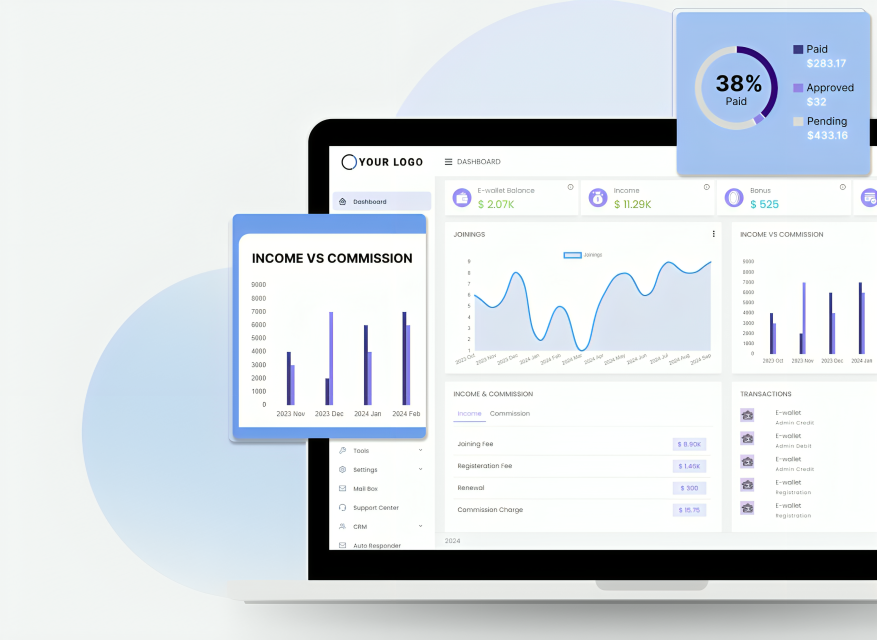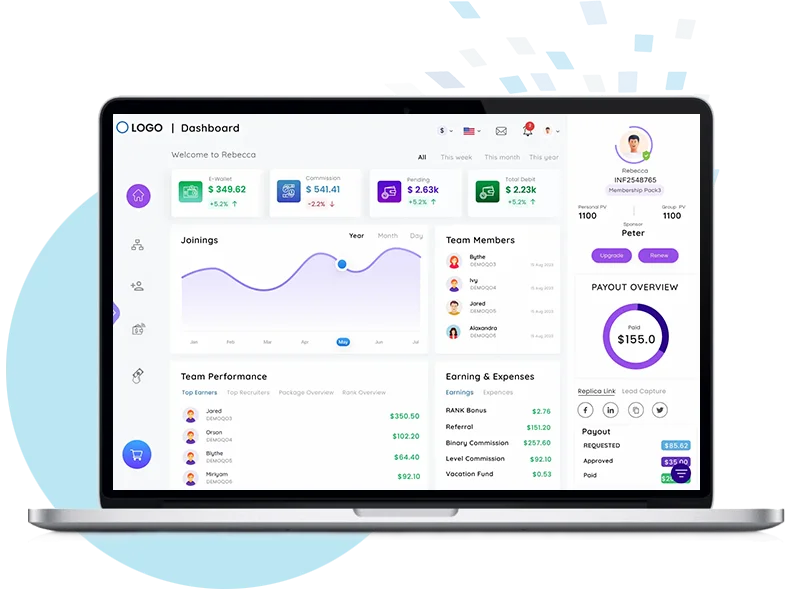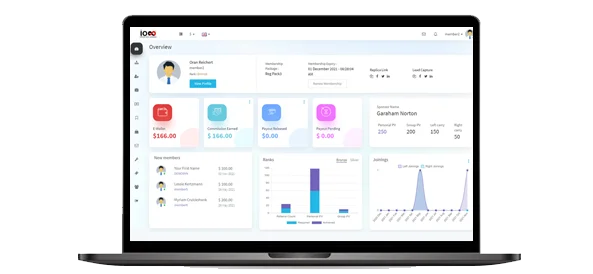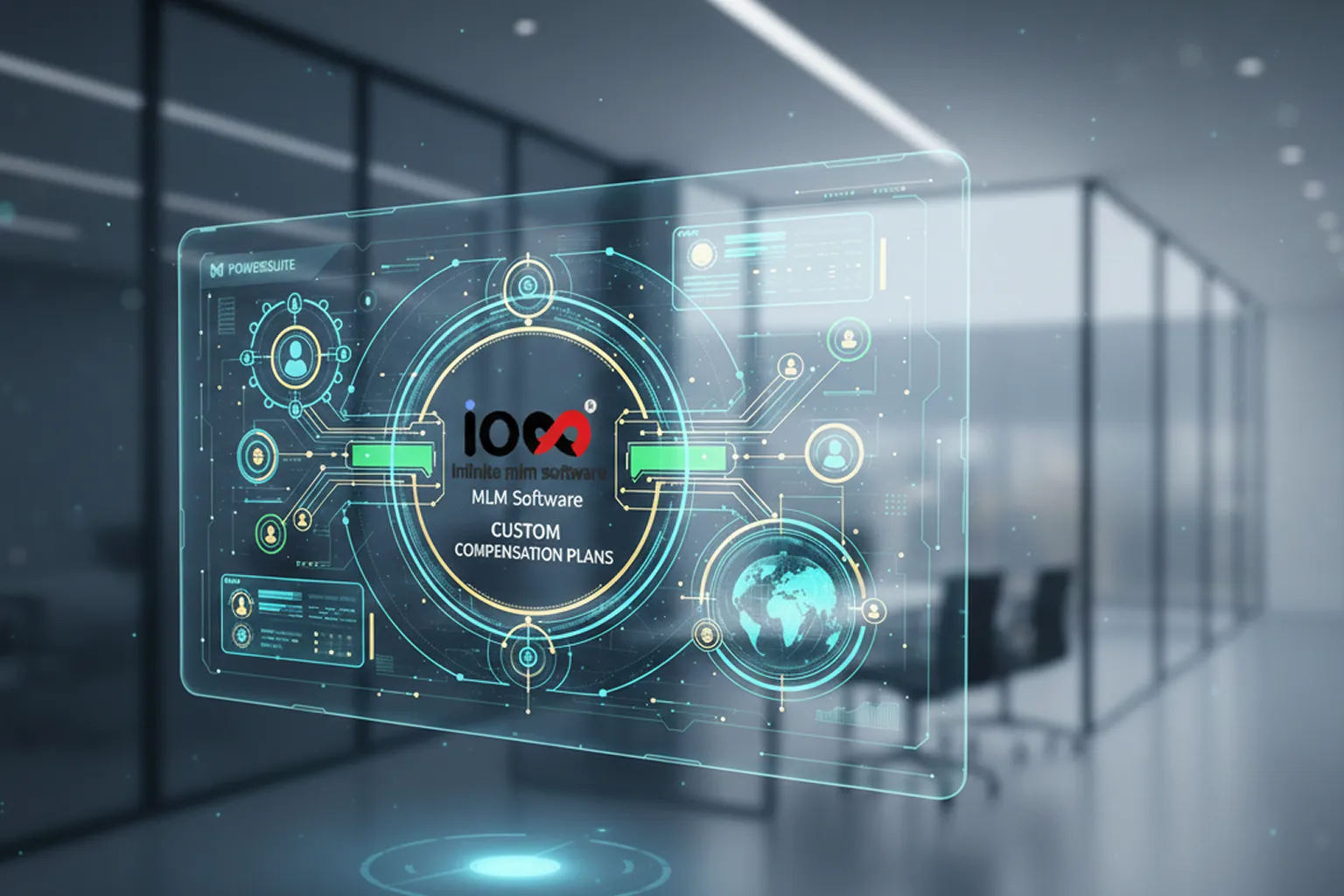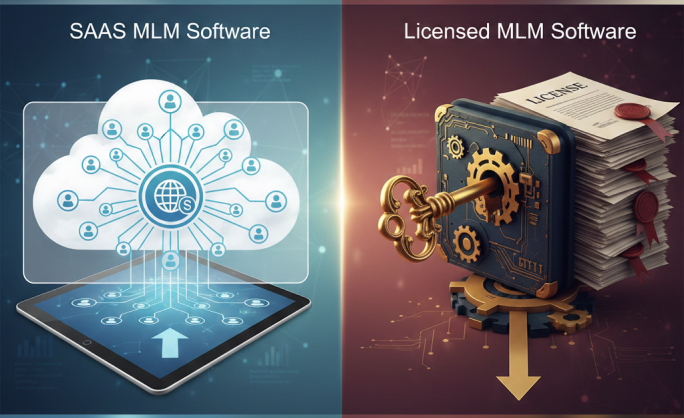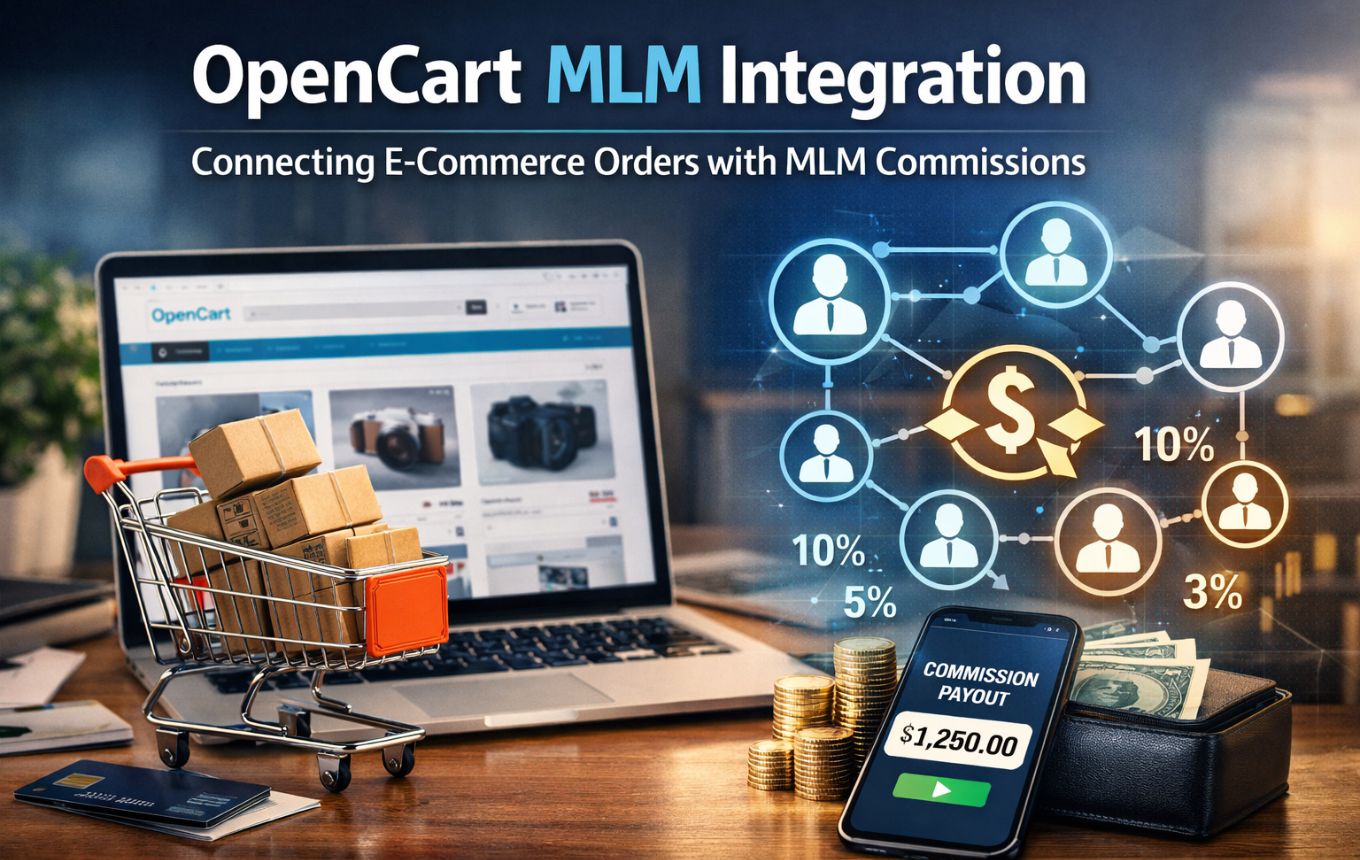In 2026, Malaysia’s direct selling industry recorded RM 34.4 billion in revenue, a 7.4% increase from the previous year, contributing 2.28% of GDP. With this level of growth, is Malaysia the next frontier for foreign MLM companies? The opportunities are significant, but so are the regulatory requirements under the Direct Sales and Anti-Pyramid Scheme Act.
For new entrants, compliance and scalability are not optional, they are the foundation of sustainable operations. This is where MLM software plays a key role, ensuring transparent records, accurate commission tracking, and reliable expansion into Malaysia’s thriving market.
Understanding MLM Legality in Malaysia
Malaysia has one of the most structured regulatory frameworks for direct selling and MLM businesses in Asia. The Direct Sales and Anti-Pyramid Scheme Act 1993 (amended in 2011) is the key legislation governing MLM companies in the country. This Act aims to protect consumers, prevent fraudulent pyramid schemes, and ensure transparency in direct selling operations.
Any foreign MLM company looking to expand into Malaysia must comply with this Act to obtain the necessary Direct Selling License from the Ministry of Domestic Trade and Consumer Affairs (KPDN).
The compliance requirements include:
- Transparent Compensation Plans: Companies must clearly outline how distributors earn incentives, commissions and bonuses, ensuring they are based on genuine product sales rather than recruitment.
- Accurate Record-Keeping: Regulators often require access to distributor earnings, sales performance, and recruitment activity to verify that the model isn’t pyramid-based.
- Product Approvals: All products, whether health supplements, cosmetics, or household goods, must be registered and approved by the relevant Malaysian authorities before being marketed.
- Fair Distributor Treatment: Regulations also protect distributors from misleading income claims or unfair contract terms.
For foreign MLM companies, meeting these requirements can be complex, particularly when managing large distributor networks across different regions. This is where MLM software plays a vital role.
How MLM Software Supports Compliance:
- Automated Commission Tracking: The commission software ensures payouts are calculated only from verified product sales and according to the approved compensation plan, reducing the risk of errors or illegal commission structures.
- Transparent Records: Every transaction, sales, recruitment, rank advancement, and commission, is digitally logged and easily accessible. This allows companies to provide regulators with accurate reports during audits.
- Real-Time Monitoring: Software dashboards allow management to monitor distributor activity, ensuring compliance with Malaysian rules in real-time instead of relying on manual checks.
- Data Security & Scalability: With secure cloud-based solutions, companies can store sensitive distributor and customer data safely while scaling their operations across Malaysia without losing compliance oversight.
- Regulatory Adaptability: Since laws evolve, modern MLM platforms can be configured to adjust compensation rules or reporting structures in line with new legal requirements.
Confused by the endless list of MLM software?
Join Infinite MLM Software; trusted by 3000+ enterprises worldwide to power growth and deliver lasting success.
Get Started Today | ContactUsLicensing & Regulatory Requirements
Foreign MLM companies must obtain an AJL License from the Ministry of Domestic Trade and Consumer Affairs (KPDN) before starting operations in Malaysia. The license requires a full disclosure of the compensation plan, distributor agreements, and product approvals, along with proof of financial strength. To meet these standards, businesses must also demonstrate that distributor earnings are tied to product sales, not recruitment.
Once licensed, maintaining compliance is equally important. Regulators regularly request data on distributor activities, commission payouts, and sales volumes. This is why many companies rely on MLM software with automated reporting modules; it reduces manual errors and ensures every sale and commission is properly documented. In addition, having built-in audit trail features allows management to present regulators with accurate, timestamped records whenever inspections occur.
Even commission payouts, which must follow approved channels, can be handled through integrated e-wallet systems. This not only meets the financial transparency expected by KPDN but also improves efficiency for distributors receiving their earnings.
Company Registration & Business Setup
Before a license application can move forward, a company must register a legal entity in Malaysia. Options include a private limited company (Sdn. Bhd.), a branch office, or partnerships with local distributors. An Sdn. Bhd., for example, requires at least one local director and a registered office, while a branch office ties the foreign company more directly to its overseas parent. Each option has its own compliance and governance expectations.
Building the right infrastructure is equally important. Regulators expect a functional local office, customer service channels, and distribution support. To make operations smoother across borders, many firms deploy MLM platforms that support multiple languages and currencies from the start. In Malaysia’s multi-ethnic market, this means distributors can use the system in Malay, English, Mandarin, or Tamil, while international participants can transact in both Malaysian Ringgit and other global currencies.
Even small details such as integrating with local payment gateways help foreign companies establish credibility. When distributors can receive commissions in their local accounts without delays, it shows that the company is committed to building trust and meeting the market’s practical needs.
Market Entry Strategy for MLM in Malaysia
Foreign MLM companies often start by aligning with Malaysia’s most in-demand product categories, particularly health supplements & wellness items, beauty products and personal care solutions. These categories resonate strongly with local consumers who are already accustomed to purchasing through direct selling channels. Launching with market-tested products not only accelerates acceptance but also builds distributor confidence in promoting them.
The competitive landscape is active, with both established local players and international brands operating in the space. Many competitors have shifted to digital-first strategies that prioritize online recruitment, virtual training, and e-commerce sales. This makes it essential for new entrants to adopt a similar approach. A market-ready MLM platform equipped with e-commerce integration and mobile apps allows distributors to start selling and enrolling new members immediately, without waiting for traditional infrastructure to be set up.
Distributor dashboards further add value by giving every participant real-time insights into sales, commissions, and team growth. By combining popular product lines with a digital-first operational model, foreign companies can position themselves to compete effectively in Malaysia’s growing market.
Building a Distributor Network
Success in Malaysia depends heavily on how quickly and effectively a company can build and support its distributor base. Recruitment starts with offering attractive opportunities, but retention depends on transparent compensation, fair rewards, and continuous training. Distributors who feel confident about how earnings are calculated are far more likely to stay engaged and committed to the business.
Here, technology makes a direct difference. Features such as replicated websites allow every distributor to run a personalized storefront without additional cost, helping them build credibility with customers. Rank advancement tracking ensures distributors can see their progress clearly, reducing disputes and motivating performance. At the same time, a modern back-office system gives each distributor access to their own sales reports, team performance data, and payout details; all from a single interface.
By embedding these tools into the distributor journey, companies not only make recruitment easier but also create a culture of trust and transparency that strengthens long-term network growth.
Marketing & Branding in Malaysia
Effective marketing and branding are essential for foreign MLM companies entering Malaysia. A combination of social media, influencer collaborations, and culturally relevant campaigns helps build trust and reach a wider audience.
Social Media & Digital Presence
- Malaysia has one of the highest social media penetration rates in Southeast Asia.
- Facebook, Instagram, and TikTok dominate brand discovery and engagement.
- Short-form videos, product demos, and live selling drive consumer interest.
- MLM software with social media integrations allows distributors to share official content efficiently.
- WhatsApp and Telegram groups are widely used for promotions and community building.
- Mobile-ready apps enable distributors to track campaigns and sales performance in real time.
Live Commerce & E-Commerce Channels
- Platforms like Shopee and Lazada offer live commerce opportunities to reach new audiences.
- Integrating e-commerce into MLM operations simplifies product ordering for customers.
- Distributor dashboards provide insights into sales trends and team performance.
- Mobile applications allow real-time updates on inventory and orders.
- Digital payment integrations ensure secure, fast transactions.
- Promotions during online shopping events increase visibility and conversions.
Influencer Marketing & Community Engagement
- Collaborating with local influencers in health, wellness, and beauty increases credibility.
- Micro-influencers often generate higher trust within niche communities.
- Distributors can act as brand advocates using personalized storefronts.
- Hosting online and offline workshops educates consumers and distributors alike.
- User-generated content enhances authenticity and brand reach.
- Replicated websites maintain consistent branding across all distributor channels.
Consumer Trust & Transparency
- Clear product claims and labeling compliance are essential for credibility.
- Malaysian consumers are cautious of pyramid schemes, making transparency critical.
- Sharing verified distributor earnings builds confidence in the business model.
- Customer engagement tracking helps monitor satisfaction and service quality.
- Testimonials and before-and-after product stories support trust-building.
- Compliance with local laws and visible certifications reassures both consumers and regulators.
Refunds, Support & Product Verification
- Easy refund and return policies enhance consumer confidence.
- Responsive customer service channels improve satisfaction and loyalty.
- Automated product traceability protects against counterfeit goods.
- Secure e-wallet systems ensure accurate and transparent commission payments.
- Prompt issue resolution reduces complaints and maintains brand reputation.
- Tracking systems within MLM software provide audit-ready records for every transaction.
Localized Marketing & Cultural Relevance
- Bilingual or trilingual campaigns (Malay, English, Mandarin) ensure accessibility.
- Promotions tied to local holidays and cultural events resonate with consumers.
- Halal-certified product labeling appeals to Malaysia’s majority Muslim population.
- Collaborations with NGOs or wellness campaigns enhance credibility.
- Seasonal subscription bundles encourage repeat purchases.
- Loyalty programs and reward points strengthen long-term customer relationships.
By integrating technology-driven tools such as MLM software, personalized storefronts, and customer engagement tracking, companies can strengthen distributor performance, enhance transparency, and establish a credible presence in Malaysia’s competitive MLM market.
Risks and Challenges for MLM Companies in Malaysia
Expanding in Malaysia presents several challenges that require careful planning. Companies must maintain ethical practices and protect their reputation to build long-term trust.
Pyramid-Scheme Perception
Challenge: Misunderstandings about compensation models can make the company appear
like a pyramid scheme.
Solution: Clearly document compensation rules and display actual distributor
earnings using software-based dashboards.
Managing a Large Distributor Network
Challenge: Tracking a growing network of distributors manually can lead to errors
and disputes.
Solution: Use MLM software for sales verification, commission tracking, and
rank advancement, ensuring accurate records and timely payouts.
Fraud and Unauthorized Activity
Challenge: Fake sales or manipulation of commissions can occur within the
network.
Solution: Implement fraud detection features and automated
monitoring to flag unusual activity early.
Regulatory Compliance
Challenge: Failing to report taxes or sales accurately can result in fines or
license suspension.
Solution: Generate tax-ready reports and maintain audit trails
automatically through the MLM platform.
Distributor Retention and Motivation
Challenge: Lack of transparency and unclear tracking can reduce distributor
engagement.
Solution: Offer clear performance tracking, replicated websites, and transparent
commission reports to build trust.
Consumer Trust
Challenge: Unclear product claims or exaggerated marketing can damage brand
reputation.
Solution: Track customer engagement and feedback through the platform and ensure
all communications reflect actual product benefits.
By addressing these challenges with clear policies and MLM software tools for reporting, tracking, and verification, companies can operate efficiently, maintain credibility, and build long-term trust in Malaysia’s regulated MLM environment.
Case Studies & Best Practices: Successful Foreign MLM Companies in Malaysia
Global MLM companies that entered Malaysia have shown how compliance, localization, and distributor engagement are key drivers of success. Below are brief case studies of five international brands that built a strong foothold in the country.
Amway
Amway was among the earliest MLM companies to establish itself in Malaysia, starting operations in 1976. By building a vast distributor network of more than 450,000 members and maintaining strict compliance with local licensing laws, it became a household name. Amway’s success reflects how early market entry, coupled with consistent branding, can secure long-term dominance.
Herbalife
Herbalife entered Malaysia in 1993 with a focus on nutrition and wellness. Its science-backed products resonated with health-conscious Malaysians, helping it build both trust and demand. The company’s strategy of combining global credibility with local distributor training allowed it to establish a strong and loyal base in the market.
Vorwerk
Vorwerk, best known for its Thermomix® appliance, expanded into Malaysia more recently. Despite being a new entrant, its premium positioning and product demonstrations quickly captured attention in the direct selling space. Vorwerk’s case shows how niche, high-value products can carve out a strong presence even in a competitive market.
Mary Kay
Mary Kay began operations in Malaysia in 2000, focusing on skincare and cosmetics. By empowering women through its beauty consultant model and using products to local preferences, the company created a personal and community-driven brand image. Its case illustrates how a global company can succeed by aligning with local cultural and social values.
Nu Skin
Nu Skin entered Malaysia in 2001, offering personal care and anti-aging products. Using its strong global presence, the company emphasized innovation and distributor support to grow its network locally. Today, Nu Skin is recognized as a trusted brand in the wellness and beauty sector, showing how consistent innovation supports market growth.
These case studies show that successful foreign MLM companies in Malaysia focus on compliance, product localization, and strong distributor relationships. Their strategies highlight lessons that new entrants can apply to achieve sustainable growth in this highly competitive sector.
Your MLM business deserves more than outdated tools.
Step into the future with Infinite MLM Software; built to scale, adapt, and drive your success in 2026 and beyond.
Try Free DemoConclusion
Malaysia remains one of the most attractive markets for MLM expansion, but success comes only with a structured approach. The roadmap is clear: establish the right legal entity, secure AJL licensing, introduce products aligned with local demand, empower distributors, and focus on steady growth.
Sustainability in this market relies on ethics and transparency. Foreign entrants must ensure fair compensation, accurate reporting, and compliance at every stage. This is where MLM software becomes more than a tool; it serves as the backbone for financial accuracy, distributor management, and regulatory alignment.
For companies ready to expand, the action plan is simple: build on compliance, stay transparent, and embrace technology as the driver of scalable and trustworthy growth in Malaysia.
FAQs
Yes, MLM is legal in Malaysia but strictly regulated under the Direct Sales and Anti-Pyramid Scheme Act 1993 (amended 2011). Foreign companies must follow compliance requirements closely to avoid being mistaken for pyramid schemes.
The AJL (Direct Selling License) is issued by the Ministry of Domestic Trade and Cost of Living (KPDN) and is mandatory for all MLM companies. Without this license, a company cannot legally market or distribute products in Malaysia.
The approval timeline varies but generally takes several months. The process involves background checks, product approvals, submission of audited documents, and meeting specific capital requirements.
Foreign companies often establish a private limited company (Sdn. Bhd.) or a branch office. The choice depends on operational flexibility, tax considerations, and long-term expansion goals.
Health supplements, wellness items, skincare, beauty products, and lifestyle appliances remain top-performing categories. Consumer demand is driven by Malaysia’s rising middle class and increased awareness of health and personal care.
MLM companies are subject to corporate income tax, typically at 24%. Depending on the product category, Sales and Service Tax (SST) may also apply, making accurate reporting essential for compliance.
The key is to emphasize product value rather than recruitment. Companies must maintain transparent compensation models, ensure fair distributor earnings, and present clear sales records to regulators and consumers.
Some of the most common challenges include securing licenses, adapting to cultural and consumer preferences, managing a wide distributor base, and protecting brand reputation in a competitive industry.
Yes, having a registered local office and appointing local directors are generally required. This setup not only supports licensing but also strengthens local presence and trust with distributors and consumers.
Technology plays a central role in compliance, reporting, and distributor engagement. Using MLM software enables companies to manage commissions, track distributor performance, and maintain audit-ready records for regulatory inspections.
